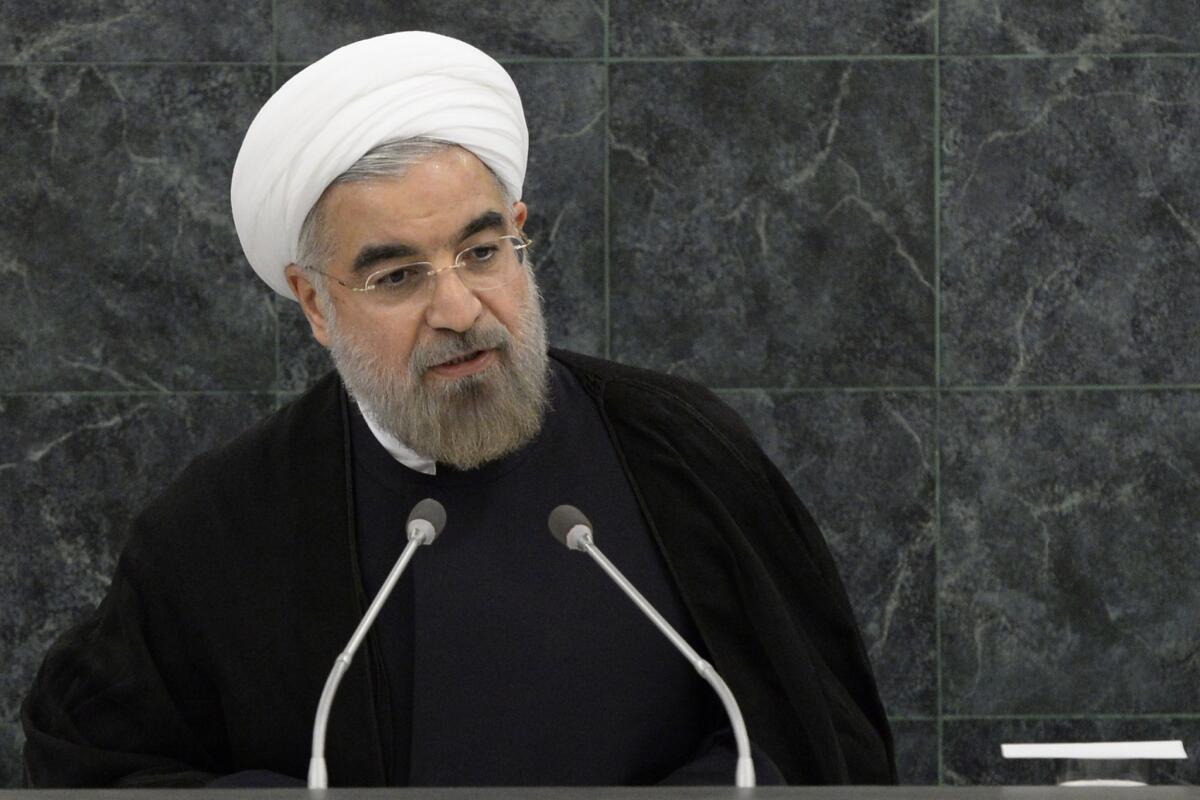U.S. needs action, not words, from Iran

- Share via
Iranian President Hassan Rouhani’s visit to the United Nations this week is being analyzed in excruciating detail for signs that the long-stalled negotiations over Iran’s nuclear program can finally gain traction. What exactly did Rouhani mean when he talked about peace and moderation? The media blitz has been interesting, but what really matters is what Rouhani does with his first 100 days in office.
Although a new leader’s first 100 days is admittedly an arbitrary marker — the Iranian president’s U.N. speech punctuated the halfway mark — in Rouhani’s case, it will be a reasonable test of whether he can match his words with actions. Will Tehran show any willingness to end Iran’s nuclear weapons program?
For starters, Rouhani needs to make it crystal clear whether Iran is prepared to accept President Obama’s long-standing offer to establish direct, substantive and meaningful negotiations between the U.S. and Iran. Does he have the political courage to take this step? More important, does he have the abiding blessing of Ayatollah Ali Khamenei, the supreme leader?
If we get to this point, Rouhani must bring something new and meaningful to the table. Until now, the Iranian negotiators have offered minimal nuclear concessions in exchange for maximum financial and oil sanctions relief. Since his election, the only nuclear-related action taken by Rouhani has been to announce that his foreign minister, Javad Zarif, a veteran Iranian diplomat known to many in the West, will represent the country in upcoming nuclear negotiations. It remains to be seen though how much authority Zarif will have.
And neither Zarif nor Rouhani has shown a willingness to commit to a freeze in Iran’s nuclear program, as called for in successive U.N. Security Council resolutions.
Although the U.S. should engage in negotiations if the opportunity presents itself, we must make clear that, absent a concrete, comprehensive deal, Iran’s economy will continue to suffer. The economic sanctions imposed on Iran over the last half-decade have shaken the government, and inarguably contributed to the Iranian people’s discontent with hard-line rule.
To show our seriousness, the Senate should pass and Obama should sign our comprehensive Iran sanctions legislation that overwhelmingly passed the House of Representatives in July. And we must continue to make clear that all options remain on the table to prevent Iran from achieving a nuclear weapons capability.
In nuclear negotiations, the U.S. should pursue a deal in which significant and verifiable steps by Iran to dismantle its nuclear weapons program are met with gradual and limited concessions. To be clear, such a deal could only go into effect after Iran takes substantial and verifiable steps, and allows for better monitoring and cooperation with the International Atomic Energy Agency.
Although the new Iranian president speaks the language of conciliation, we must not allow ourselves to be fooled. According to the most recent IAEA report, the Iranian government continues to move full speed ahead with its nuclear weapons program, installing advanced centrifuges and building a heavy water reactor that could eventually produce plutonium. Iran also continues to engage in a range of other odious and destabilizing activities, including its support of Hezbollah and Bashar Assad’s slaughter in Syria.
By the end of Rouhani’s 100 days — in mid-November — we will be in a better position to judge whether there truly is an opening for a workable diplomatic solution. The House Foreign Affairs Committee will hold a hearing as that approaches to assess this possibility.
Our current Iran policy reflects more than 30 years of violent and destabilizing behavior from Tehran, and there will not be support in Congress for an easing of sanctions absent a significant and lasting change in Iran’s behavior. Such a change cannot be demonstrated by soothing words alone, but must be proved through concrete action.
Rep. Ed Royce, a Republican from Fullerton, is chairman of the House Foreign Affairs Committee. Rep. Eliot Engel, a Democrat from New York, is the committee’s ranking member.
More to Read
A cure for the common opinion
Get thought-provoking perspectives with our weekly newsletter.
You may occasionally receive promotional content from the Los Angeles Times.






